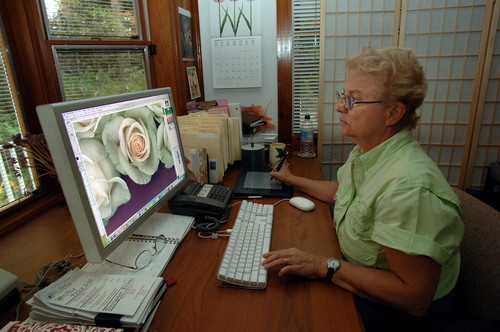Dream chaser Newsday article
I was featured in a Newsday Business section article written by Arlene Gross. The excerpt focusing on my background and my life choices is copied below. If you’d like to see the article in it’s entirety you can see it on my website in the Press section.
Dream chasers
At midlife, taking lower pay to begin more satisfying careers
By Arlene Gross
Special to Newsday
11:07 AM EST, January 4, 2008
 Mary Ahern had (experimented) in art for many years, but had never been able to actually make a career of it. Until four years ago, that is, when she made the switch to full-time artist.
Mary Ahern had (experimented) in art for many years, but had never been able to actually make a career of it. Until four years ago, that is, when she made the switch to full-time artist.
“I had always been a creative artist,” the Northport resident, explained. “Life, however, intervened, and as a single parent, I was never able to create my art on a full-time basis.”
Changing careers at midlife is no small feat, and switching to one with substantially less earning potential is more difficult still. According to Randy Miller, founder and president of ReadyMinds, an online career counseling service, downsizing a career can be a source of great anxiety.
 Yet for some people, any fear or hesitation is mitigated by the yearning to follow a dream. Seeking more spiritually uplifting endeavors can be the ultimate challenge, and Miller said any attendant loss of income is often compensated with a renewed sense of purpose and newfound happiness.
Yet for some people, any fear or hesitation is mitigated by the yearning to follow a dream. Seeking more spiritually uplifting endeavors can be the ultimate challenge, and Miller said any attendant loss of income is often compensated with a renewed sense of purpose and newfound happiness.
“There are a lot of people who go through life and think, ‘What if?'” Miller said. “With a strategic plan, coupled with the new passion and ultimate objective of doing something different, one can more easily achieve their ultimate goals.”
For Ahern, a new husband provided the impetus and financial support to move forward. Income, the couple concluded, was less relevant to the quality of their lives than the legacy they wish to leave behind.
“When we married, Dave urged me to follow my dream,” she recalled. “The hard part at first was trying to find inside myself what that dream actually was. You spend so much time marching forward and doing what you do, you lose the essence of yourself.”
Once their five children — all from previous marriages — were finished with college, Ahern felt it was OK to follow her calling.
“My income from my art doesn’t yet come close to the money I’m used to making in either my career in computer graphics equipment sales or my own graphics design firm,” she said.
One of her greatest sacrifices was a big dip in retirement savings, which now come exclusively from her husband’s salary.
“We have a comfortable nest egg,” she said, “but by coming out of a conventional career, I no longer have the extra cushion to add to my existing portfolio of tax-advantaged savings vehicles.”
Despite her diminished earnings, Ahern says she is happier. “I am living the life I am meant to live,” she said.


Comments
Dream chaser Newsday article — No Comments
HTML tags allowed in your comment: <a href="" title=""> <abbr title=""> <acronym title=""> <b> <blockquote cite=""> <cite> <code> <del datetime=""> <em> <i> <q cite=""> <s> <strike> <strong>